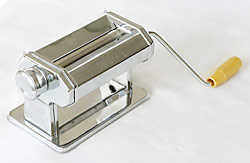
Many polymer clay artists and hobbyists consider the pasta machine to be an essential tool. While it is entirely possible to work with clay without one, the pasta machine does make conditioning clay a much easier and faster process. This useful tool also simplifies creating sheets of clay of uniform thickness and making skinner blends.
If you happen to have an old (hand-cranked) pasta machine stowed away in a kitchen cabinet, you can certainly use it with polymer clay, but once you do, it will no longer be safe to use for making pasta. If you don't already have a pasta machine, you can find them in kitchen supply stores or in the polymer clay section of craft stores-- or on-line.
People who have physical disabilities or those who use their pasta machines extensively may wish to invest in a pasta machine motor. These are not cheap, but if you fit into either of the groups mentioned above, it may be worth the investment.
A few notes about pasta machines:
- Different brands of pasta machines have different numbers assigned to the thickness settings. So while the lowest number indicates the thickest setting on one PM, it indicates the thinnest setting on another PM. It is important to remember this when following a tutorial on-line or a project in a book.
- Pasta machines do require some maintenance, and following a few simple rules can prolong the life of your machine. (See links below.)
- There are several brands of pasta machines available. Some are sturdier than others. You may wish to research the differences before you make your purchase. (See links below.)
- If you're trying to save money and don't insist on having a particular brand, you can sometimes find a PM on sale at craft stores (check sale papers). Using a coupon (such as the 40%-off coupons distributed by Michaels and Hobby Lobby) can also give you a good deal on a PM. It may even be possible to find a PM at a thrift store. People sometimes buy them or receive them as gifts, only to discover later that they never use them.